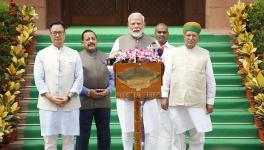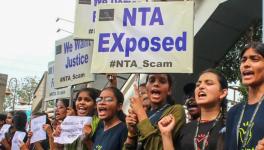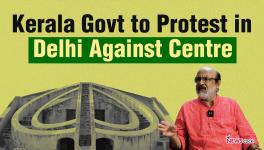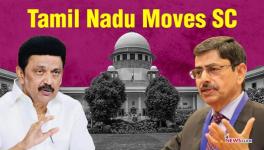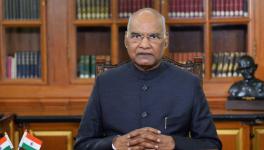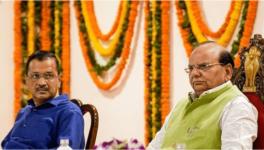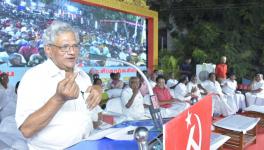Activists Slam DMK for ‘Diluting’ Local Body Powers Through Panchayat Act Amendments
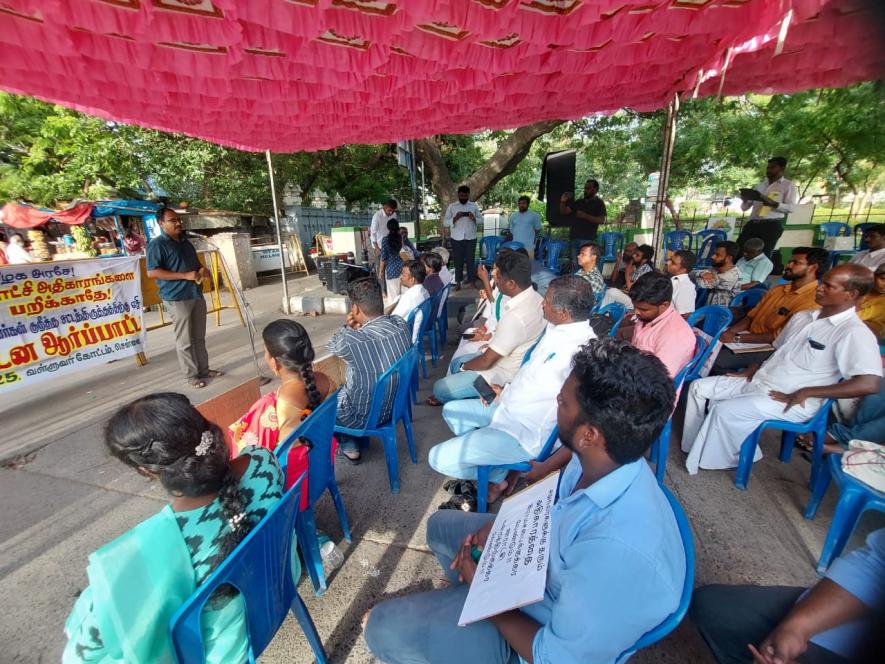
Jayaram Venkatesh, the convener of anti-corruption NGO Arappor Iyakkam, addresses a protest. Image courtesy: Thannatchi.
Local body representatives and activists have strongly opposed the two recent amendments made to Tamil Nadu Panchayats Act, 1994, terming them as a means to “centralise power and curtail democracy”.
Earlier, the Panchayat enforced Rules 104 and 106 of the Act—transfer of officers and servants and power to punish officers and servants, respectively. The amendments have shifted the powers to the inspector or any other state government official, meaning that the Panchayat’s powers over its secretary are diluted.
“When we spoke to government representative Amudha, IAS she said that the amendments were made to curtail corruption,” Nandakumar, of Thannatchi, an NGO that works for strengthening local bodies, told Newsclick. Amudha is the principal secretary in the Rural Development and Panchayat Raj Department Secretariat.
POWER DILUTION
Nandakumar feels that the amendments could increase corruption instead of curbing it. “This might lead to more corruption because government officials would feel that they are not answerable to the Panchayat. Secretaries will be under BDOs or higher authorities.”
Jayaram Venkatesh, the convener of anti-corruption NGO Arappor Iyakkam, said, “I would like to ask Amudha, ‘There has been a lot of corruption in your department in the last 10 years. Have you taken action against a single IAS officer?’”
Nandakumar alleged corruption “even in supply of bleaching powder and lighting” in the Pradhan Mantri Awas Yojana. “But local body polls weren’t held then and the powers were vested with the special officers,” he said. Urban and rural local body polls were held in Tamil Nadu after a gap of more than 10 years in 2021 and 2022, respectively.
Balakrishnan, Tamil Nadu coordinator of the SKM, said, “Corruption is not an ideological question. Aravind Kejriwal came to power saying he will abolish corruption but nothing happened. If corruption has to be eradicated, then full-fledged democracy should bloom in the state.”
Ramalingam, a Panchayat president in Karur district, said that presidents are not corrupt because they are one with the people. “People come to our doorsteps with problems of lack of electricity, water and sewage. Presidents might even spend from their pockets. The government has a wrong view of Panchayat presidents,” he said.
CR Bijoy, who specialises in gram sabhas and tribal rights, said that Panchayats are “dysfunctional because of lack of control”. “How much funds are there in the hands of local bodies? Instead of diluting their rights, the government should empower them further. The law does not empower the elected representative; only the bureaucrats are powerful.”
Terming the amendments as “fraud”, Bijoy said that they are “against” the spirit of the Constitution. “The major problem is that we are run by the colonial system; we need more decontrol and democratisation,” he added.
Local body representatives lashed out at the DMK during a protest organised by Thannatchi on June 25 saying the ruling party is demanding more powers from the Centre but “curtailing the powers of the local bodies”.
Maripandi, from Madurai, said, “If the amendments were made to empower gram sabhas, we would have called this a ‘Dravidian government’ and ‘people’s government’ but the government is making rules to centralise powers. When we were expecting more freedom, it is unfortunate that the state has brought the panchayat secretary, a worker of the local body, directly under the district.”
Prabakaran, of Thannatchi, said, “The government is constantly questioning the Union on democracy, federalism and social justice. For whom is this democracy? They only want federalism between the Centre and the state.”
Criticising the MK Stalin government’s move further, Prabakaran said, “The Assembly was held for nearly 25 days but 22 amendments, including those to the Panchayats Act, were made on the last day. Did the 234 MLAs discuss the amendments? The ruling party condemned the Centre for introducing farm laws. But the 22 amendments were made on a single day though the Assembly was in session for nearly one month.”
Selva, who also belongs to Madurai, said, “Prior to winning elections, the DMK was upholding gram sabhas. We thought that if it comes to power, local bodies would be empowered like in Kerala. The amendments were a sudden blow. Now, it is evident that the DMK campaigned only for votes.”
KERALA, NAGALAND MODELS
Activists reiterated that empowering the people is the means to progress and further centralisation cannot be an option.
Bijoy cited the Nagaland Communitisation of Public Institutions and Services Act, 2002, according to which any services can be transferred to villages. “It has been successful,” he said.
Citing the Forest Rights Act, 2006, Bijoy further said, “The authority to determine individual, territorial and community rights was handed over to the gram sabha and more than 15 lakh hectares have been titled since the law was established.”
Batting for vesting powers in local bodies, Venkatesh also called for “checks and balances to ensure transparency and accountability”. “In case, local bodies are not functional, the state can withhold finances. Financing is largely still with the state. We have not distributed funds like Kerala has done.”
Comparing Tamil Nadu with Kerala, Ramalingam said, “To transfer a patta at the Taluka office we have to dole out Rs 10,000-Rs 20,000 and wait for 5-10 days. In Kerala, it is done within three working days of submitting the form. Why can’t it be done in Tamil Nadu?”.
Prabakaran too compared the two states. “What is people’s movement? Go to Kerala and see what it means. No other state than Tamil Nadu has 502 schemes that don’t benefit the people.”
Thannatchi has announced that it will continue pressuring the state till the amendments are withdrawn.
Get the latest reports & analysis with people's perspective on Protests, movements & deep analytical videos, discussions of the current affairs in your Telegram app. Subscribe to NewsClick's Telegram channel & get Real-Time updates on stories, as they get published on our website.










